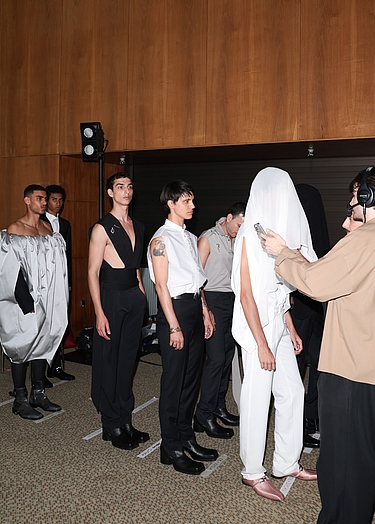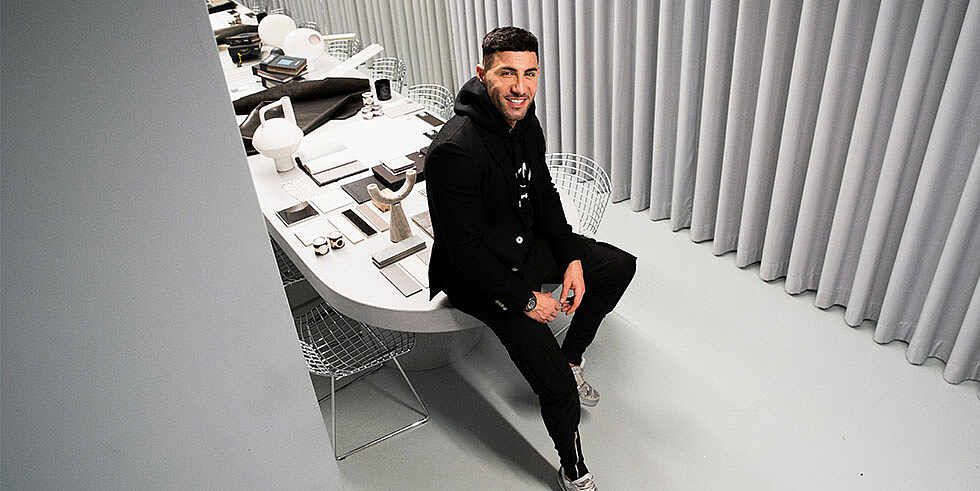
News

Already in March 2022, the first Metaverse Fashion Week took place on the Decentraland platform. Major labels such as Dolce & Gabbana staged themselves in the virtual world in front of a large audience of equally virtual visitors:inside and demonstrated in the form of digital runway shows and wearables that accessibility for the end consumer already offers great potential and almost unlimited possibilities for creativity, brand experiences and customer relationships.
Current examples of the development of the industry are also shown by these two recent projects.
The Berlin-based start-up yoona.ai, which develops a new approach to digital fashion with ultra-realistic 3D designs for the B2B/B2C sector, won the European Metaverse Award in October and paves the way for resource- and cost-saving user experiences for buyers and consumers without a physical presence. With the "Yoonaverse - The Berlin Metaverse®", fashion brands can present their immersive collection experiences at Berlin Fashion Week in January 2023.
And the AMD (Academy of Fashion and Design) also launched its own Metaverse project on the topic of fashion sustainability in November of this year as part of the Global Fashion Conference together with the design department of the Fresenius University of Applied Sciences, in which the German Fashion Council, an official partner of Berlin Fashion Week, was also involved. With a virtual marketplace that provided access to information, inspiration and communication, a digital place was created that showed the additional possibilities to accompany physical events.

Fashion label Marcell von Berlin also took advantage of this forward-thinking, hybrid approach during Berlin Fashion Week in September. As an off-site event alongside the classic runway shows, designs from the new collection were presented in the showroom of Berlin brand experience agency SHOWZ with the help of augmented reality, bringing the concept of a virtual, futuristic shop window to life. The technical implementation was done by the agency together with STYLE PROTOCOL and Studio Deussen.
The audience of the Berlin Fashion Week as well as passers-by could activate the virtual ambience of a fictitious desert landscape, inspired by the landscape of Los Angeles, via smartphone and scanning of a QR-code at the shop window and discover the designer's creations.
The installation showed the already existing possibilities of a shop window of the future, which can be created almost everywhere and under sustainable aspects and adapted at any time. Especially for the B2B sector, this offers new, innovative facets and multipliers: from brand awareness, customer journey and experience to new sales channels - just through technology that connects the real world with the Metaverse and beyond.
And even the self-contained metaverse today offers brands and designers new economic outlets and no less creative potential through the ever-growing virtual community that is reshaping, interacting and generating potential sales.
What the fusion of real and virtual interaction can mean for Berlin Fashion Week in the future and to what extent a symbiosis of both worlds offers added value, Ayan Yuruk, founder of the agency SHOWZ, tells us in an interview.
Dear Ayan, thank you very much for your time and the interview. Briefly, did you follow the Metaverse Fashion Week in March yourself? If so, what is your summary?
Of course we followed Metaverse Fashion Week as a team. There was a big rush in advance, because the brands did the marketing for it very smartly. You could buy individual outfits in order to go to the virtual shows at all. However, the disadvantage was that DECENTRALAND as a metaverse does not meet the quality standards that one is used to and expects from e.g. modern video games nowadays. That is to say, the visual design was still very pixelated and the fashion did not come into its own accordingly. But what worked very well was the press and marketing buzz around it. It was talked about weeks before, everyone wanted to see what was going on and the brands that participated were omnipresent. Other metaverses are more mature in terms of quality, but DECENTRALAND is still the best known of the existing ones at the moment. We are still in the exploration phase. Brands are not yet making huge sales in the metaverse. The real world remains an important component for one's own brand and marketing structure, especially after the pandemic, face-to-face interaction has become noticeably more important again. The metaverse should therefore not take place completely detached from the rest, but should be integrated into one's own marketing strategy.
With Showz, you are significantly driving innovative brand experiences as described above. What experiences did you have with the implementation for Marcell von Berlin at the last Berlin Fashion Week?
These concepts are still very new for the fashion scene in DE and we can create a lot of enthusiasm for the topic.
Would you say that the recognition of the potential that the Metaverse offers is increasing?
Definitely. The Metaverse is already being used for direct exchange in the B2B sector, be it as conferences for and with experts, training courses or workshops, and thus the possibilities are naturally developing further and further, which in turn increases interest and openness to becoming part of it.
Could such virtual events be a realistic competition for the offline (fashion) world?
In the near future, I don't think the virtual world will take over. Of course, the virtual offer will grow, because the possibilities to extend the brand experience and offer customers more than in the physical world are completely different. The storytelling and boosting of a brand is the interesting thing about the virtual world and of course companies will use this more and more at some point. Many brands are already looking to move into the metaverse, such as Balenciaga or commercially H&M, but for smaller brands and designers it is of course a question of budget. If it doesn't necessarily add value, then it's worth considering whether it makes sense to jump on the hype right away.
Thinking BIG: Could there also be a stand-alone Berlin Fashion Week in the metaverse in the future?
That's what our capital city stands for. We are the center of the tech industry and start-up scene in this area, and of course the fashion and labels are very bold and avant-garde. Berlin definitely has the potential for a virtual fashion week.
Will you already surprise us with more events for the upcoming Berlin Fashion Week in January?
Absolutely. :)